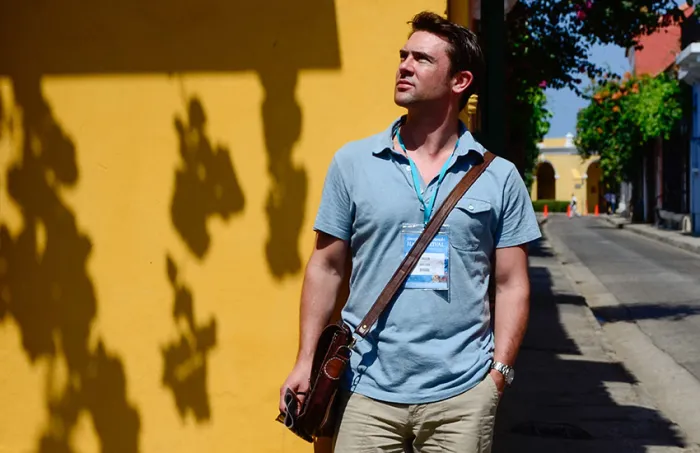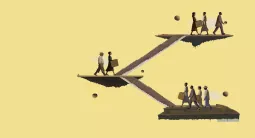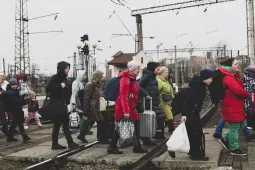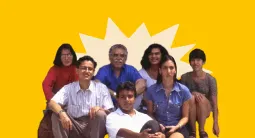The two worlds of Charlie F., writing about war through someone else's eyes

Charlie F. stands alone on stage, under the light, one leg (or what is left of it) hanging on the crutches and the other supporting his stocky body. He looks directly at the audience and tells his story. Attention!, name, age, city, serial number, how he lost his leg in Afghanistan. Other voices emerge from the darkness, other men and women shout their story to an unseen drill sergeant.
But Charlie F. is not a number, a statistic of war injuries in Afghanistan. He is based on a man named Cassidy Little, who joined the UK Royal Marines on a bet and is now missing his right leg. He is one of the 14 military recruits and non-professional actors on stage in Bravo 22 Company, at the play The Two Worlds of Charlie F., presented at the Theatre Royal Haymarket, in London’s West End. Owen Sheers, Welsh playwright, poet and novelist developed the script after interviewing them for some weeks.
Sheers and the director, Stephen Rayne, traveled around the UK, visiting barracks, personnel recovery units and rehabilitation centers. “We became well-acquainted with the names of certain drugs, types of prosthetics, military jargon”, wrote Sheers in The Guardian. Even before he interviewed the soldiers, Sheers wrote the humorous “medication song”, a list of medication – ibuprofen, paracetamol, omeprazole, esomeprazole, fluoxetin, citalopram – representing their addiction to drugs prescribed for their physical and psychological trauma.
The two worlds of Charlie F. is a collection of stories that begin when the characters join the army and that focus on their wounding in Afghanistan and their recoveries back in Britain. The voices overlap and compose a cacophonic experience of something waiting to explode. Many joined the army in the footsteps of their fathers, others dreamed of being soldiers. But many were not just joining the army, “they were leaving something else: a broken home, a bad situation, unemployment”, says Sheers. The recruiting scene is striking and intensely political, even if Sheers admits that he didn’t want to politicize the war in Afghanistan. The author was surprised by the fact that the actors “were all very negative about how the army recruits, the false promises; and where they recruit – many recruiting stations are in the poorest parts of towns. It’s something we don’t acknowledge: the clear class division in recruitment”, says Sheers.
The topics were brought up by the individual interviews and the group discussions. “What was more useful than anything else,” says Sheers, “was hanging out with them. Having lunch, drinking in the evening.” They opened up, slowly. “I was asking very difficult questions. ‘What was it like when you first killed someone?’, ‘How did war affect your sex life?’ What is interesting is that many of them were more honest at that first meeting than when I asked the same questions six months later. Partly as a result of the play, later, they were already more aware of what they were saying.”
The army is more of a hell than the Promised Land they once imagined. And this is clear especially in the scene presenting the 21st century soldier: the men receive instructions on how and why they must drag a 70kg gear on their backs under the ruthless desert sun or the snow of the Afghan mountains. The Brigadier asks one of them to undress and hold his rifle, ready to attack – “clean your rifle, then yourself, think of the rifle and then yourself!”, he orders. With a red ink pen he marks on the man’s naked body the consequences of stepping on a bomb. Like an animal in a slaughterhouse, the human body is torn into little red pieces by the shell fragments of a violent explosion. Even if warfare changed so much – from stones to rifles, horses to tanks, missiles and drones –, human anatomy did not. “This is where speeches end. This is where war happens. Here. On the bodies of men”, says the soldier.
Sheers explains that he asked them to choose a name for their character. That distance between truth and narrative was crucial for the process of rehabilitation: “The speeches are in the voice of Charlie, not Cassidy Little, and that makes a lot of difference.” Sheers and the director were both very resistant to the idea of verbatim theatre although they were told “not to mess with ‘facts’, with the ‘truth’”, with the material from the interviews. “Someone who writes knows that you get much closer to the truth by ‘telling lies’, by inventing.” The most important aspect of playing a character was, explains Sheers, “enabling them to stand on stage”. They enroll at first as “simply” traumatized, wounded, injured soldiers and become someone else on stage, embodying a character through narrative.
Although at the beginning neither Sheers nor the actors knew how they could work together to build something which combined their testimonies and Sheers’s words, the result is surprising. At any point in the play, one can tell who is who, distinguish Cassidy from Charlie, separate the speech of those men from what happened to them in real life. “The fact and the fiction, the character and the real person are intertwined like this”, says Sheers, holding his hands together.
Is not too long until we see these men in combat: the wait, the Afghan dark starry sky at night, the sand, the dust, the despair of “positive identification” or the impossibility of understanding the peasants speaking Arabic. Someone dies; letters from the family arrive; another day of combats, another day of boredom or excitement, of not knowing who is coming towards you. And then an explosion. What is it like? “Grit in my hands, knees, mouth. Shit and dust. Shit, skin flakes, and sand”, says Charlie.
Charlie and the others are now back in the UK in a rehabilitation centre. It seems that returning home is harder than the fighting a war. “Worse at night, always worse at night”, they sing. The pain is always there. They take drugs. They hurt themselves. They memorize a list of official diagnoses – claustrophobia, combat stress, combat fatigue, shell shock, PTSD – and lists of medication, symptoms, and side effects. Wives and mothers want to help but don’t know how. Sitting in their wheelchairs, the men dance with their partners. This is a heartbreaking scene in the play, a dance of courtship and rejection, love and revulsion, waiting for the pain to go away. They think they have lived in two different worlds, but, says Charlie, there is only this one.
First there is one man with one leg. Then, many more men with no legs, prosthetics, or other types of wounds. These wounds make them individual, unique, despite the shared context of trauma. The dancing, however, unifies them: “It was on purpose. Even though they were able bodies many were in a lot of pain. We wanted to address the physicality of the cast immediately up front. It’s about empowering people. The three people who do the most powerful dance in the piece only got three legs between them. It’s like with all actors: you start with the body.”
There is not a continuous line between memory and identity. It is this fragmented, sometimes confusing or even “fake” (re)construction of memory after a traumatic event that triggers creativity, or the building of a worldview out of crumbling notions of identity. Sheers reveals that there were times he felt that the stories were repetitive “quite often I got this relatively well-packaged discourse that I thought might be the shell; but that was a very important starting point”. Other times he felt many stories were simple deception: “You try to detect the most internal truth in the story. So even if you feel that it has been fabricated or exaggerated, you must learn why. It is also about different hierarchy of experiences, they had very different wars. One guy is a marine, was in combat a lot. Killed a lot of people. And that was what was troubling him. Another guy, aged 19, flew out there, went on to the fire range on his first day just to test his weapon, steps on a mine, bang!, home. He never saw any combat. When he first spoke to me, he fabricated a whole story about being out on patrol.” It’s not easy to explain the fabrication of stories. The memory of a traumatic event can be punctuated by holes that might never be filled, silences that cannot be erased. But Sheers refuses to talk about “lies” or “deception”: “Is about investing meaning in your injury. Ok, you fabricated this. But you need to believe that this thing was ‘happening’, it was invested with meaning. And some of them actually downplayed what happened to them, because sometimes it was so extraordinary that they tell it as a matter-of-fact way.”
Even if he insists that the play is not about politics, Sheers admits that writing about different conflicts, as he did in the last decade, remains pertinent to the current wars. “In Afghanistan, 22% of combatants have been injured – a higher percentage than during the Second World War”, writes Sheers in the Guardian. It was only after playing the English World War I poet, Wilfred Owen on stage that he became interested in war. “It has never been intentionally but it’s something that grew organically, through my work. Because I played Wilfred Owen, and I did it in a lot of schools, I realized that we still teach WWI in Britain through the poets: why don’t we talk about WWII poets?” Since then, war has been a very striking part of Sheers’s work. “I’ve been writing professionally for the last twelve, fifteen years and Britain has been involved in conflicts for the last twelve, fifteen years. [The novel] Resistance’s setting is the WWII but I wrote it because I was interested in questions about insurgency, collaboration, and occupation in Iraq and Afghanistan. We keep going to war and I’ll keep on writing about it.”
Sheers long poem Pink Mist, based on the interviews for Charlie F, will come out this spring. He now hopes that other countries take this model of working through testimony on stage to deal with consequences of conflicts involving both military personnel and civilians. “I’m quite passionate about our experience, us forming a little body that can make other countries take this model.” Charlie F. is “a process of rehabilitation”, says Sheers. And “rehabilitation starts because they are on stage, acting.”






